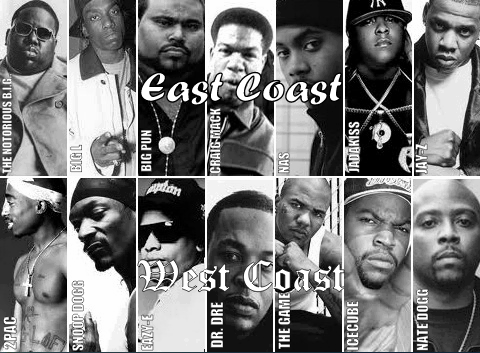
Are you surprised that I am reviewing something that isn’t metal? Yeah, I am too! Gangster rap is my favorite sub-genre of rap because of the lyrics, the beats, and the overall attitude of the genre. In some ways, gangster rap reminds me of metal because of how intense the songs are and ferociously violent the lyrics of some of the songs. Sometimes when listening to gangster rap, you can imagine riffs from guitars instead of beats and this is when you can see the semblance between metal and gangster rap.
Gangster rap emphasizes the “gangsta,” “O.G.,” and “thug life” lifestyle. The genre evolved from hardcore rap and was pioneered in the mid 1980s by rappers such as Ice-t and later by rap group N.W.A. While this form of hip hop was primarily underground, it soon became the most commercially lucrative sub-genre of hip hop. Many gangster rap artists openly talk about their associations with various active street gangs as part of their image, with the Crips and Bloods being the most represented. There have been a lot of criticism against gangster rap claiming that it promotes gang violence, substance abuse, and other criminal activities. Others have come to the defense of gangster rap and have stated that this music tells a story of personal lives and brings awareness of what goes on during inner-city violence. In my opinion, both of these things, can be true. Gangster can, both, promote and lend awareness to violence.
Ice-T released “6 in the Mornin’” in 1986 and is often regarded as the first gangster rap song. Ice-T has been an MC since the early ‘80s but transitioned into gangster rap themes after he was influenced by Philadelphia rapper Schoolly D and his 1985 album, “Schoolly D.” Schoolly D not only influenced Ice-T, but also Eazy-E and N.W.A., as well as the Beastie Boys.
This first blockbuster gangster rap album was N.W.A.’s “Straight Outta Compton,” which was released in 1988. This album established West Coast hip hop as a vital genre and established Los Angeles as a legitimate rival to hip hop’s long-time capital, New York City. In the early 1990s, former N.W.A. member Ice Cube would further influence gangster rap with his hardcore, socio-political solo albums.
Run DMC is often credited for popularizing hardcore and confrontational attitudes and lyrics in hip hop culture; but in my opinion, Run DMC is not even close to being brutal like gangster rap. They do talk about partying and objectifying women, but nowhere near the subject matter, language, and the tempo of gangster rap. In some of Public Enemy’s tracks you can hear some of the early gangster material that influenced the sound that became popular. Rappers like LL Cool J also influenced the overall lyrical format that gangster rap would later use. This type of lyrical content reminds me of hardcore music that you hear today in the metal scene.
In 1992, former N.W.A. member Dr. Dre released “The Chronic,” a massive seller which showed that explicit gangster rap could hold mass commercial appeal just like pop-oriented rappers. This album established the dominance of West Coast gangster rap and began to create the sub-genre of G-funk – a slow, drawled form of hip hop. Dr. Dre’s “The Chronic” is one of my favorite all-time records because of the beats, lyrical content, and the grooves of the songs. This type of rap reminds me of groovy death metal in a way, both are easy to dance to. Death Row Records rappers Snoop Dogg and 2pac helped spread the popularity of gangster rap and G-funk. Other popular and influential G-funk rappers, Warren G and Nate Dogg also helped popularize this sub-genre of music into mainstream media.
The feud between East Coast/West Coast gangster rap hit mainstream media in the late ‘90s. Rappers from New York City such as Wu-Tang Clan, Nas, The Notorious B.I.G., and Lil’ Kim, etc. pioneered a grittier sound known as East Coast hardcore hip hop in order to take back dominance from the West Coast. It has widely been speculated that the “East Coast/West Coast” battle between Death Row Records (West Coast) and Bad Boy Records (East Coast) resulted in the deaths of Death Row Records’ 2pac and Bad Boy Records’ The Notorious B.I.G. The feud is also credited for the downfall of the Gangster Rap genre. Add to this that, most of these artists are millionaires and can no longer relate to the streets that raised them. However, you can still find many people (including tons of metalheads) who still love Gansta’!
Here are some of my favorite gangster rap albums/songs!
- Dr. Dre – The Chronic (album)
- Favorite songs: F*** wit Dre Day & Nuthin’ but a G thang
- Snoop Dogg – Doggystyle (album)
- Favorite songs: Gin N juice, Who Am I (What’s My Name)?, Murder Was The Case
- Friday (Original Motion Picture Soundtrack)
- Favorite song: Keep Their Heads Ringin’ – Dr. Dre
- Regulate (single) by Warren G and Nate Dogg
- Gangsta’s Paradise (single) by Coolio
- Fantastic Voyage (single) by Coolio
Stay Metal,
THE SAW
